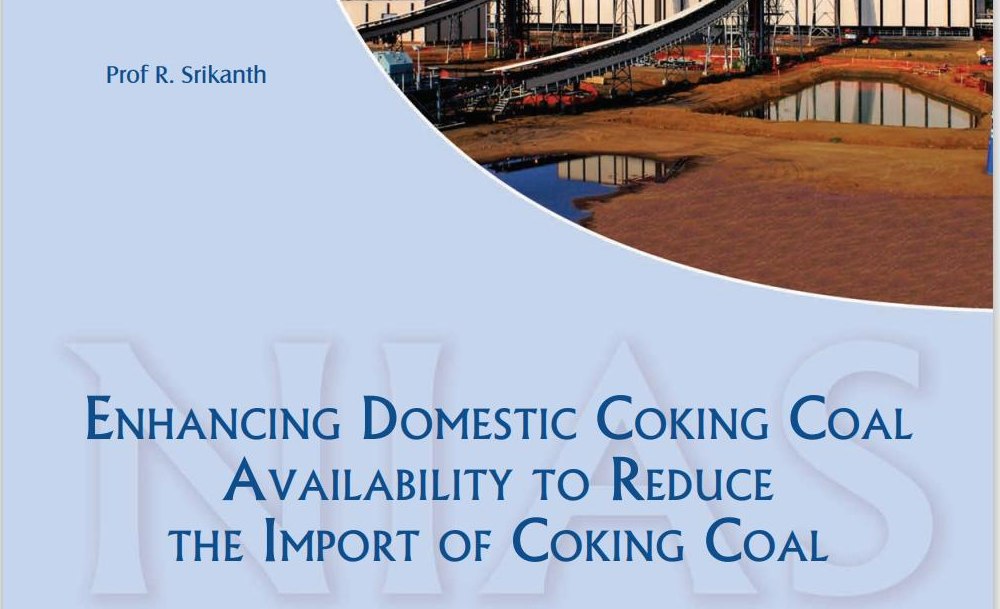Table of Contents
India’s steel sector, one of the largest in the world, relies heavily on coking coal as a raw material. Despite possessing vast reserves, the country imports a significant amount of coking coal, resulting in a massive financial burden. The latest NITI Aayog report titled “Enhancing Domestic Coking Coal Availability to Reduce the Import of Coking Coal” sheds light on this critical issue and suggests effective strategies for boosting domestic production to reduce reliance on imports. Here’s an in-depth analysis of the report’s key findings and recommendations.
Why is Coking Coal Critical for India’s Steel Industry?
Coking coal plays a pivotal role in steel manufacturing. It is used to create coke, a crucial ingredient in the blast furnace process for producing steel. Coking coal constitutes about 42% of steel production costs, making it an essential raw material for infrastructure development and downstream industries that create millions of jobs in India.
However, India’s coking coal import dependency is alarmingly high—around 85%, far exceeding that of the European Union, which is approximately 62%. This heavy import reliance leads to a significant financial outflow, with India importing 58 metric tonnes of coking coal at a cost of approximately Rs 1.5 lakh crore in FY 2023-24, despite having vast domestic reserves.
Enhancing Domestic Coking Coal Availability to Reduce Import Dependence: NITI Aayog Report 2024 PDF
India’s Untapped Coking Coal Reserves
India holds an impressive 5.13 billion tonnes of prime-quality coking coal and 16.5 billion tonnes of medium-quality coking coal. These reserves are more than enough to meet the country’s steel sector needs. However, inefficiencies in coal mining and washing processes have led to a situation where domestic coking coal production fails to meet demand. The report highlights that the capacity utilization of public-sector washeries was less than 32% in FY 2022-23, with only 35-36% of washed coal being produced, compared to 75% from private sector washeries.
Recommendations for Enhancing Domestic Coking Coal Availability
To reduce the country’s dependence on coking coal imports, NITI Aayog proposes several strategies:
- Include Coking Coal in the List of Critical Minerals
Coking coal should be declared a critical mineral by the Indian government. This designation would allow for special provisions aimed at enhancing production. Given that coking coal is essential for steel production and infrastructure development, including it in the critical minerals list would help ensure long-term supply security. - Boost the Capacity of Coal Washeries
The report recommends improving the efficiency of public-sector coal washeries, which currently lag behind private-sector facilities. Increasing the capacity utilization of these washeries could drastically reduce the need for imported coking coal. - Amend the Coal Bearing Areas (CBA) Act, 1957
To foster greater private sector involvement, the report suggests amending the CBA Act. This amendment would allow private companies to take a more active role in the coking coal mining process while ensuring that public-private partnerships continue to function effectively. - Enable the Sale of Byproducts from Washeries
The report also recommends that the government allow joint venture companies to sell byproducts from coking coal washing processes, such as middlings and tailings. This would help offset washing costs and pass savings onto steel plants, further reducing the overall cost of coking coal.
Global Comparison and Strategic Importance
The European Union has already recognized coking coal as a critical raw material, alongside minerals essential for green energy production, such as lithium and cobalt. India’s move to categorize coking coal as a critical mineral would align its policies with global standards and enhance the country’s competitiveness in the global steel market.


 World Day of Social Justice 2026: Theme,...
World Day of Social Justice 2026: Theme,...
 NHAI to Develop India’s First Bee Corr...
NHAI to Develop India’s First Bee Corr...
 Loggerhead Turtles – Ecology, Habitat,...
Loggerhead Turtles – Ecology, Habitat,...




















